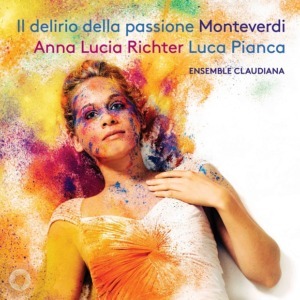Anna Lucia Richter - Press Reviews

Monteverdi Il delirio della passione
This [Lamento della Ninfa] is just one moment of many that mark out Anna Lucia Richter’s performances on this record as constituting something of a watershed in the history of Monteverdian heroines, a new and focused voice, richly varied in its tonal palette, unafraid to exploit the full gamut of human emotion so dramatically etched by the composer. Richter’s bright, clean, focused tone, precise diction and keen sense of drama will be familiar from her performances in an impressively wide-ranging portfolio … The heart of her achievement on this recording is undoubtedly the lament from Arianna, the only part of the opera to have survived. With its sure-footed command of the patterns and cadences of the Italian language, from Arianna’s agonised opening cry to her desperate urgent repetitions of Teseo’s name (the strong rhetorical feature that links the sections and provides emotional architecture), this is a powerful reading. It is surely the only serious competition in the catalogue to Cathy Berberian’s classic performance with Nikolaus Harnoncourt from the 1970s.
Iain Fenlon Gramophone, May 2021
Richter’s declamatory storytelling reaches an impressive peak in the Lamento d’Arianna where every device of characterisation and emotional evocation is brilliantly deployed … this selection provides a fresh and unusual look at many Monteverdi favourites.
Anthony Pryer, BBC Music Magazine, May 2021
Richter’s soprano is true and bright and when she does unleash it, as in the sacred aria, Confitebor tibi Domine, it rings out pleasingly… The long Lamento from the otherwise lost L’Arianna is profound and shows Richter’s art at its best: detailed, luminous and heartfelt.
Francis Muzzu, Opera Now, May 2021
…her voice has a glorious substance and joy… A beautiful life-enhancing disc of the very first order.
Colin Clarke, Classical Explorer, 28 April 2021
Richter’s light and supple voice provides a melodious contrast from the instrumental episodes, whose vitality can be first heard in the crisp tambourine. There is a pleasing variety across each of the vocal solos as well – some are extroverted while others, like the final words, are barely above a whisper. …
This diverse collection offers some of Monteverdi’s finest works, making it just as suitable for an enthusiast as someone less familiar with the range of his output. All around, an enjoyable listen – and recommended without reservation.
Azusa Ueno, Classical Review, 22 April 2021
Anna Lucia Richter intones perfectly with her clear, charmingly timbred and perfectly placed soprano voice, and also delivers rhythmical assurance with playful ease. Musical expression and a highly individual approach to music and its infinite nuances take precedence over virtuosity and the display of technical attributes.
Dr Ingobert Waltenberger, Online Merker, 21 March 2021
It seems impossible to me that anyone would not be impressed by this exquisite art of singing by the versatile German soprano (now mezzo soprano) Anna Lucia Richter, who appears in almost every kind of repertoire and can claim to be one of the most important vocalists of our time … [Richter] gives us her ‘melody of speech’ with an – as she herself puts it – ‘inscrutable emotional depth’ in which every word, if not every syllable and every comma is expressed with a spontaneity that erases every trace of advance artistic calculation. It sounds like it was all created on the spot.
Aart van der Wal, Opus Klassiek, March 2021
The opening number gives you the range of expression Richter brings and the instrumental colours of Ensemble Claudiana … A powerful performance of Arianna’s Lament – the range of the music here can be quite startling. Overall it’s a potent Monteverdi showcase.
Andrew MacGregor, BBC Radio 3 Record Review, 13 March 2021
Her well-chosen anthology of Monteverdi is so sunny, so alive… Richter and Pianca give us a near-perfect blend of solemnity and froth… It’s all terrific… Beautifully engineered too; this has already been pencilled into my provisional ‘Best of 2021’ list.
Graham Rickson, The Arts Desk, 13 March 2021
With absolute vocal security, a beautiful timbre and great interpretations,[Richter] proves to be an eminent baroque singer. Since she has her own style of performance, in which she uses her voice in a more nuanced, colourful and less virtuosic way than, for example, Simone Kermes and Joyce Di Donato do, she stands out pleasantly from these two divas and still inspires with a fascinating and very personal performance. This is Monteverdi as one would wish him to be: light, expressive, colourful and, above all, stylistically flawless.
Remy Franck, Pizzicato, 8 March 2021
This CD is clearly one of the finest I’ve heard of any of Monteverdi’s music… The entire CD takes off like a firecracker; even the slow pieces, such as the Lamento d’Arianna, have an underlying drive to them, aided by Richter’s rich and highly expressive voice, that grabs your attention and doesn’t let go.
Lynn René Bayley, The Art Music Lounge, 3 February 2021

Heinz Holliger
Photo Priska Ketterer
Commission: Heinz Holliger’s Reliquien
Holliger, here, is inspired by the short funeral music (D. 79) that a 16-year-old Schubert had written for himself: the voice, piano and clarinet explore together or separately all the nuances of the Schubertian sound. Most admirable here, perhaps, is the way Holliger, rather than just writing a bravura piece for her [Richter], penetrates the heart of his young interpreter’s vocal identity to feed his own writing, giving us a kind of sound X-ray of this performer’s extraordinary gift.
Dominique Adrian, ResMusica, 11 January 2019
Reliquien is… a very interesting examination of texts by Schubert… Richter’s interpretation was outstanding, every word, every phrasing expressed with intelligence and skill. And the soprano makes no difference between Holliger, Spohr and Schubert. All songs were performed with the same intensity and seriousness.
Alain Steffen, Tageblatt, 10 January 2019
…the direct effect [of the music] is undeniably physical and spiritual. The shaping of the work by the three protagonists at the premiere in the presence of the composer was exemplary.
Uwe Krusch, Pizzicato, 10 January 2019
